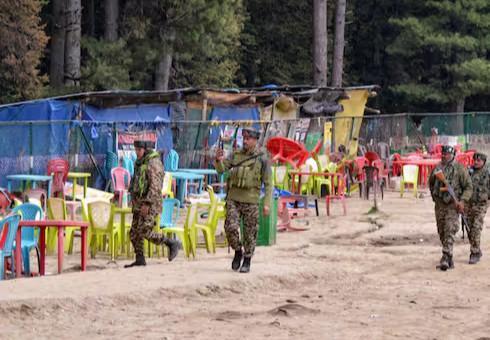
Terrorists hiding in J&K told to block roads if war erupts, damage policemen’s homes: Report
The already fragile situation in Jammu and Kashmir has taken a grave turn as reports have emerged that terrorists affiliated with Jaish-e-Mohammed and Lashkar-e-Taiba have been instructed to take drastic measures if a war breaks out between India and Pakistan. According to CNN-News18, citing intelligence sources, these terror outfits have asked their members hiding in Jammu and Kashmir to be on high alert and to block highways if war erupts between the two neighboring countries.
Furthermore, the terrorists have reportedly been told to damage police personnel’s homes, a move that is seen as a retaliatory measure, reminiscent of the destruction of terrorists’ homes that took place after the Pahalgam terror attack.
The latest development comes at a time when tensions between India and Pakistan have been escalating, following a series of violent incidents along the Line of Control (LoC). The situation has been further complicated by the killing of a Pakistani army officer in Kashmir, which Pakistan has blamed on Indian forces.
The reported instructions to the terrorists to block roads and damage police personnel’s homes are seen as a clear indication of the escalating rhetoric and aggressive posturing between the two countries. It is feared that if the situation spirals out of control, it could lead to a full-blown war between India and Pakistan, which would have devastating consequences for the region and the world.
The decision by Jaish-e-Mohammed and Lashkar-e-Taiba to instruct their members to take drastic measures is seen as a desperate attempt by these terror outfits to remain relevant and to gain attention in the face of increasing pressure from Indian security forces. In recent years, the Indian military has launched several operations to eliminate terrorist hideouts and infrastructure in Jammu and Kashmir, which has led to significant reversals for these terror outfits.
However, the latest development also highlights the complex web of relationships between terrorist groups and state actors in the region. It is widely believed that Pakistan’s military and intelligence agencies have historically provided support to Jaish-e-Mohammed and Lashkar-e-Taiba, and other terrorist groups operating in Jammu and Kashmir.
The reported instructions to the terrorists to block roads and damage police personnel’s homes also raise concerns about the potential for civilian casualties and collateral damage in the event of a war. Jammu and Kashmir has already been reeling under the impact of terrorism and insurgency, and a war between India and Pakistan could lead to a humanitarian crisis of epic proportions.
Furthermore, the situation also raises questions about the role of Pakistan in the escalating tensions between India and Pakistan. While Pakistan has been accused of providing support to terrorist groups operating in Jammu and Kashmir, Islamabad has consistently denied these allegations.
The Indian government has also accused Pakistan of sponsoring terrorism in Jammu and Kashmir, and has called upon Islamabad to take concrete steps to crack down on terrorist groups operating in the region. However, Pakistan has refused to take any action against these groups, and has instead continued to provide them with support and sanctuary.
In conclusion, the reported instructions to terrorists hiding in Jammu and Kashmir to block roads and damage police personnel’s homes are a grave concern and a clear indication of the escalating tensions between India and Pakistan. The situation requires immediate attention and action from both countries to prevent a full-blown war, which could have devastating consequences for the region and the world.



